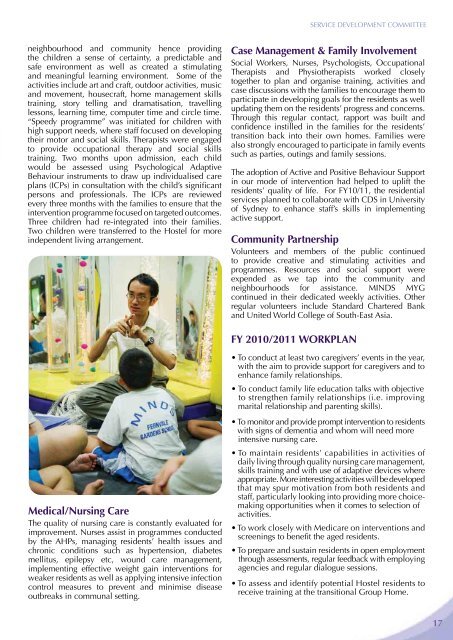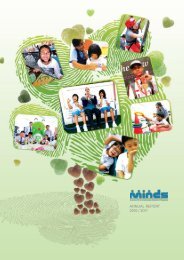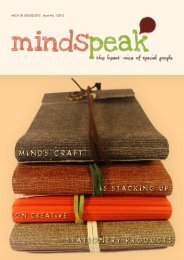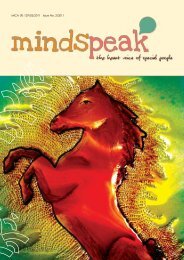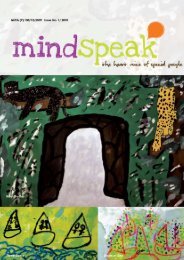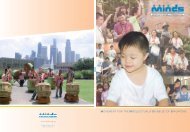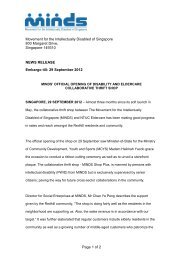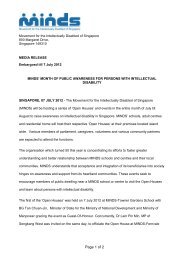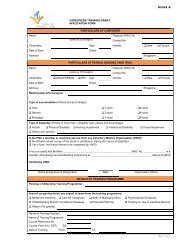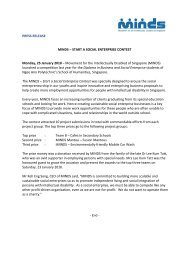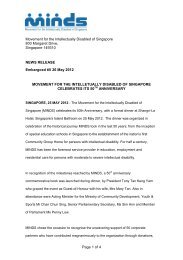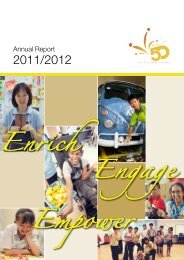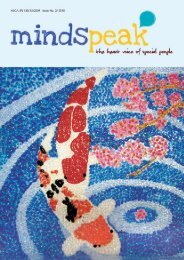2009/2010 - MINDS
2009/2010 - MINDS
2009/2010 - MINDS
You also want an ePaper? Increase the reach of your titles
YUMPU automatically turns print PDFs into web optimized ePapers that Google loves.
SERVICE DEVELOPMENT COMMITTEE<br />
neighbourhood and community hence providing<br />
the children a sense of certainty, a predictable and<br />
safe environment as well as created a stimulating<br />
and meaningful learning environment. Some of the<br />
activities include art and craft, outdoor activities, music<br />
and movement, housecraft, home management skills<br />
training, story telling and dramatisation, travelling<br />
lessons, learning time, computer time and circle time.<br />
“Speedy programme” was initiated for children with<br />
high support needs, where staff focused on developing<br />
their motor and social skills. Therapists were engaged<br />
to provide occupational therapy and social skills<br />
training. Two months upon admission, each child<br />
would be assessed using Psychological Adaptive<br />
Behaviour instruments to draw up individualised care<br />
plans (ICPs) in consultation with the child’s significant<br />
persons and professionals. The ICPs are reviewed<br />
every three months with the families to ensure that the<br />
intervention programme focused on targeted outcomes.<br />
Three children had re-integrated into their families.<br />
Two children were transferred to the Hostel for more<br />
independent living arrangement.<br />
Case Management & Family Involvement<br />
Social Workers, Nurses, Psychologists, Occupational<br />
Therapists and Physiotherapists worked closely<br />
together to plan and organise training, activities and<br />
case discussions with the families to encourage them to<br />
participate in developing goals for the residents as well<br />
updating them on the residents’ progress and concerns.<br />
Through this regular contact, rapport was built and<br />
confidence instilled in the families for the residents’<br />
transition back into their own homes. Families were<br />
also strongly encouraged to participate in family events<br />
such as parties, outings and family sessions.<br />
The adoption of Active and Positive Behaviour Support<br />
in our mode of intervention had helped to uplift the<br />
residents’ quality of life. For FY10/11, the residential<br />
services planned to collaborate with CDS in University<br />
of Sydney to enhance staff’s skills in implementing<br />
active support.<br />
Community Partnership<br />
Volunteers and members of the public continued<br />
to provide creative and stimulating activities and<br />
programmes. Resources and social support were<br />
expended as we tap into the community and<br />
neighbourhoods for assistance. <strong>MINDS</strong> MYG<br />
continued in their dedicated weekly activities. Other<br />
regular volunteers include Standard Chartered Bank<br />
and United World College of South-East Asia.<br />
FY <strong>2010</strong>/2011 WORKPLAN<br />
Medical/Nursing Care<br />
The quality of nursing care is constantly evaluated for<br />
improvement. Nurses assist in programmes conducted<br />
by the AHPs, managing residents’ health issues and<br />
chronic conditions such as hypertension, diabetes<br />
mellitus, epilepsy etc, wound care management,<br />
implementing effective weight gain interventions for<br />
weaker residents as well as applying intensive infection<br />
control measures to prevent and minimise disease<br />
outbreaks in communal setting.<br />
• To conduct at least two caregivers’ events in the year,<br />
with the aim to provide support for caregivers and to<br />
enhance family relationships.<br />
• To conduct family life education talks with objective<br />
to strengthen family relationships (i.e. improving<br />
marital relationship and parenting skills).<br />
• To monitor and provide prompt intervention to residents<br />
with signs of dementia and whom will need more<br />
intensive nursing care.<br />
• To maintain residents’ capabilities in activities of<br />
daily living through quality nursing care management,<br />
skills training and with use of adaptive devices where<br />
appropriate. More interesting activities will be developed<br />
that may spur motivation from both residents and<br />
staff, particularly looking into providing more choicemaking<br />
opportunities when it comes to selection of<br />
activities.<br />
• To work closely with Medicare on interventions and<br />
screenings to benefit the aged residents.<br />
• To prepare and sustain residents in open employment<br />
through assessments, regular feedback with employing<br />
agencies and regular dialogue sessions.<br />
• To assess and identify potential Hostel residents to<br />
receive training at the transitional Group Home.<br />
17


